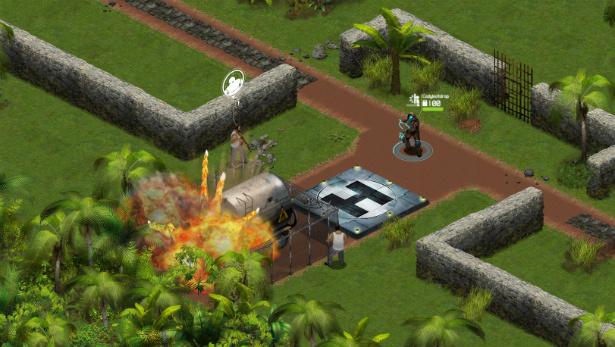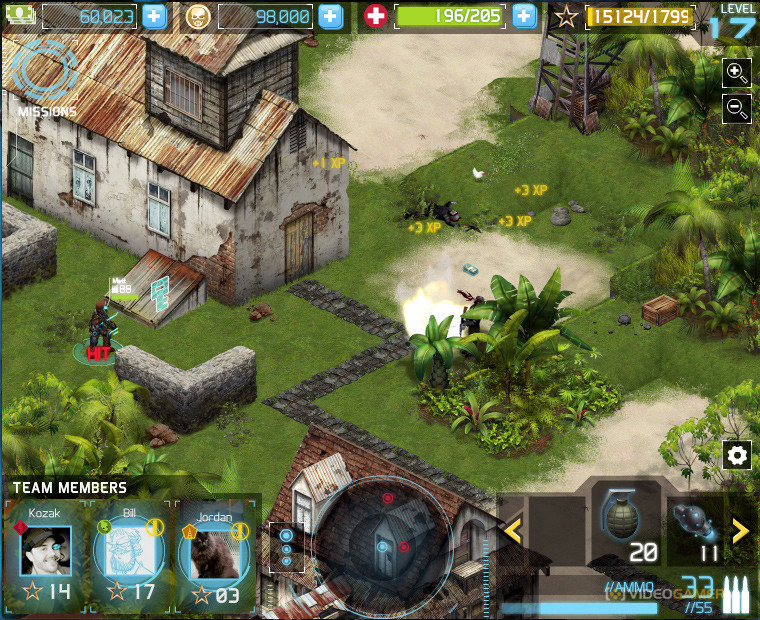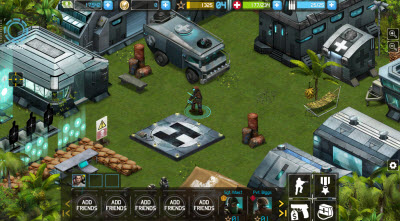This Tuesday’s release of Ghost Recon: Future Soldier (Xbox 360, PlayStation 3, PC) is just the start for Ubisoft. The publisher sees Ghost Recon as one of its biggest gaming properties, so the brand will get a huge push through multiple channels beyond traditional retail. Ghost Recon Commander, developed by Loot Drop for Ubisoft, will debut on Facebook shortly. And a free-to-play first-person shooter, Ghost Recon Online, debuts this summer. By creating more casual, free-to-play titles, Ubisoft hopes to widen the interest in Ghost Recon and eventually convert those players into hardcore fans.
Chris Early, vice president of digital publishing at Ubisoft, explains his company’s strategies on Facebook, how they’re coordinating all these different products, and most importantly, how they’re going to make money on these ambitious plans. Here is a transcript of our interview with Early.
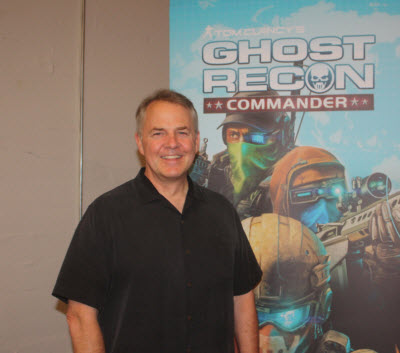 GamesBeat: How many Facebook games has Ubisoft done now?
GamesBeat: How many Facebook games has Ubisoft done now?
Chris Early: More than a dozen. And I say that with the proud bruises that go along with that because most of those games were learning experiences for us. We’ve taken a route with Ubisoft of building our talents from within. We haven’t gone out and spent hundreds of millions of dollars buying a company or something along those lines. We’ve used our 26 studios around the world that we have; we’ve found out who’s interested in making these kinds of games. Some were interested at one point but aren’t anymore because they realize it takes a different mentality making a console game than it is making a game that’s a service, like a Facebook game should be.
Yet there are some studios that are doing it well — that like it. They’ve helped us move forward with that. It’s been a learning process for us, both from a development standpoint and from the operational side of things. I think our first big success you’d probably recognize is CSI Crime City, which came out a while ago now on Facebook. But really, it helped us recognize the power that our brands have, and what we can accomplish in the Facebook space.
I’m pleased to see now that a year and a half later, we’ve now begun coming out with our own game brands on Facebook as well. Earlier this month, last month, we came out with a new brand, Horse Haven, which is the first Ubisoft brand that was there. The first branded Ubisoft game. And with Ghost Recon Commander, we’ve got the first real gamer’s game coming out on Facebook.
GamesBeat: And Assassin’s Creed for Facebook: How do you look back on that?
Early: So we didn’t brand that on Facebook. We did Project Legacy, which is what you’re referring to, on Facebook, which was something of an experiment for us — to see if it would work. At the time, everyone was telling us that gamers don’t play on Facebook. Right? I didn’t believe that because I look at myself as a gamer and I look at my friends and people like that. I thought people were there, and that’s what we found out — that tons of people actually connected from Assassin’s Creed Brotherhood [the console/PC game] to Project Legacy. But it was such an experiment for us — we didn’t even brand the Facebook game with the Assassin’s Creed brand.
GamesBeat: So Ghost Recon, then: What does that represent for you guys now as far as progress or lessons?
Early: Well, it represents a tremendous amount of progress for us because it’s the validation point. We came from the Assassin’s Creed, Project Legacy, and CSI Crime City, and so forth. Moving forward, this is a big brand. Ghost Recon is one of the top five brands that Ubisoft has. It’s breaking the mold a little bit of what you can do on the Facebook platform. We didn’t with this franchise go after a match-three version of Ghost Recon or a bubble-popping version of Ghost Recon. We’ve already got that.
We actually set out, purposefully, to make a gamer’s game. And then tying that across to the other Ghost Recon games helps reinforce the main gaming side of things. We want to have a gamer who’s interested in the Ghost Recon franchise have a place to play, a screen to play on, wherever they happen to be. That’s why I’m interested in this. With this game, too, in a few months, we’ll also be coming out on mobile. And so whether you’re at your desk at work or at your desk at home or on your console or on your phone, you’ll have a place to play Ghost Recon.
GamesBeat: And so the purpose of the game, too, is sort of to stand alone and make money by itself, or is it feeding users into Future Soldier? What are the different purposes of a Facebook game?
Early: We look at it — at every game in the companion gaming strategy — as its own stand-alone game and its own stand-alone business venture. We are planning that Ghost Recon Commander is a profitable game on its own, that entertains players all on its own, and you never have to play another Ghost Recon game, and you’ll have a great experience playing Ghost Recon Commander. From a business standpoint, this game will stand up and be profitable on its own.
Now, we also, as you know, have a number of ties to the other Ghost Recon games. So I think in some cases that will encourage people to try the other games or encourage players of other games to go play Ghost Recon Commander. I know from my standpoint in the past when I’ve seen this advantage in other games. I’m a gamer. I’m going to take advantage of whatever I can; I’m going to play to get that advantage. And so I think there will be some crossover play — some cross-pollination between the different versions of Ghost Recon. I think probably that may happen even more with Ghost Recon Online, where you can earn some things — some of the symbols that you would ordinarily have to pay for in that game. You can earn them by playing Ghost Recon Commander for free. So we do hope that fans of the franchise now have a variety of places to go. The basic premise is to entertain Ghost Recon fans and be stand-alone games and stand-alone businesses.
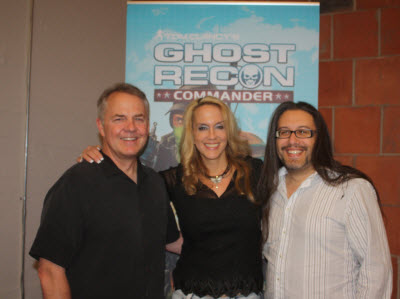 GamesBeat: You hired Loot Drop (pictured to the right: COO Brenda Garno and CEO John Romero) to make this game. How do you benefit from having tapped into a studio that specializes in Facebook games? They’re not inside Ubisoft, but this is what they do. They make Facebook games.
GamesBeat: You hired Loot Drop (pictured to the right: COO Brenda Garno and CEO John Romero) to make this game. How do you benefit from having tapped into a studio that specializes in Facebook games? They’re not inside Ubisoft, but this is what they do. They make Facebook games.
Early: I’ll take a step back from your question and look at what we do overall for our Facebook games. About half of the games we make are made internally and about half of them are made with external partners. What that really brings us is the ability to develop the talents internally — from a development standpoint and certainly from an operational standpoint — and still get the freshest amount of influx that we can from people who are experts in the field. In the case of Loot Drop, I think we’re very fortunate because we have a company that has solid social gaming skills and has a deep background in hardcore games. For us, they were the perfect match.
GamesBeat: So the other internal teams: Are they coming out of Facebook studios, too, or are they actually part of the hardcore console studios?
Early: The locations of our Facebook studios are in the same places as our other studios around the world. We have some in China, we have some in Canada, we have some in India. And the people that are in those studios that are focused on the Facebook games — I would say maybe two-thirds come from within Ubisoft and other game development efforts and about a third come from the outside and the social gaming worlds.
GamesBeat: How is it coordinated so that they all finish at the same time?
Early: I don’t want them to finish all at the same time. If I look at what’s ideal for us, we want to look at the players we’re entertaining. I don’t really want to bombard you as that player with that opportunity with the next one before you’re done with the first one. Just take what we’ve launched: CSI Crime City and House. Those are both procedural drama games. In my opinion, we waited too long between those two games to launch them. Because you could have played through CSI and been interested in that overall game loop of “hey, there’s a mystery, investigate it, and solve the case,” which is essentially the same thing that you’re doing in House: “Hey, here’s an illness, let’s investigate it, and solve the case.” If that’s the style of television show you like or a Facebook game you like to play, it would have been good for us to have them closer together. I also wouldn’t have wanted to launch them at the same time because now I’m competing with myself even for somebody who likes those types of games.
GamesBeat: So this is 10 levels? That sounds like a short game. I mean, you can do things like go to 50 levels or more in Farmville, right? How much time do you think there is in the game? For how long do you think people can play it?
Early: I’m not sure what their estimate as far as hours is, but I don’t view this as a short game at all for a couple of reasons. To begin with, there are 10 levels, but there are multiple levels of accomplishment within each of those levels. You can essentially — after you solve them on the rookie level, you go back over and over again to improve your performance in each level, and you get more rewards, which allows you to build up your base camp better. So you’re going to want to, in some cases, even possibly before you finish the tenth episode, go back and play some of the earlier episodes a couple of times if you want to improve your Ghosts and your base camp. Of course you don’t have to do that — you can also use microtransactions to get there — but you may want to do that from a play standpoint. And then there are other elements and scenarios in the game that are coming as well that extend throughout this play region, which are more missions that are coming. They are under development.
GamesBeat: What are some things that you wouldn’t do in a Facebook game that you could do in the console version? As far as cooperative styles of play go.
Early: This is an asynchronous game, and as such, our multiplayer, if you want to think of it that way, is asynchronous. The mechanisms that Loot Drop used here actually make me care more about what my friend has done than just adding them to my friends bar as a place to go gather some energy because I’m building a team that’s going to help me go succeed. If you happen to be that great assault player and I’m taking on a hard mission, then I’m going to want to hire you to be part of my team. And I’m going to care more that you continue to play — that you continue to upgrade your base. And I might actually not hire you for some time when I need to go on more of a stealth mission because of the character that you’ve built up. In that way, we’re introducing the value of your friends but from less of a synchronous standpoint. I think that we’ve taken care to also not have this be a mature title because of the broader reach of the Facebook platform overall whereas what we have on the console is definitely not the same as what we have on Facebook.
GamesBeat: I guess it would make sense to do mobile versions, too, but you guys aren’t going there yet?
Early: We are. We’re launching the Facebook version first and then Loot Drop is also making a mobile client for the game. That mobile client will use the same backend, so you can carry your progression from when you happen to be at your screen at your desk, and then when you go on your phone, your character will be in the same place and you can continue on with the same missions, same progression, same statistics.
GamesBeat: And what are you buying if you’re buying something in the game?
Early: You’re buying skulls, which is the premium currency. You can earn some of them throughout the course of the game, and then you can purchase more of them. The purchasing allows you to go ahead and buy more of the base attributes, or health, or let you continue to play for a longer period of time.
![]() GamesBeat 2012 is VentureBeat’s fourth annual conference on disruption in the video game market. This year we’re calling on speakers from the hottest mobile, social, PC, and console companies to debate new ways to stay on pace with changing consumer tastes and platforms. Join 500+ execs, investors, analysts, entrepreneurs, and press as we explore the gaming industry’s latest trends and newest monetization opportunities. The event takes place July 10-11 in San Francisco, and you can get your early-bird tickets here.
GamesBeat 2012 is VentureBeat’s fourth annual conference on disruption in the video game market. This year we’re calling on speakers from the hottest mobile, social, PC, and console companies to debate new ways to stay on pace with changing consumer tastes and platforms. Join 500+ execs, investors, analysts, entrepreneurs, and press as we explore the gaming industry’s latest trends and newest monetization opportunities. The event takes place July 10-11 in San Francisco, and you can get your early-bird tickets here.
VentureBeat's mission is to be a digital town square for technical decision-makers to gain knowledge about transformative enterprise technology and transact. Learn More
